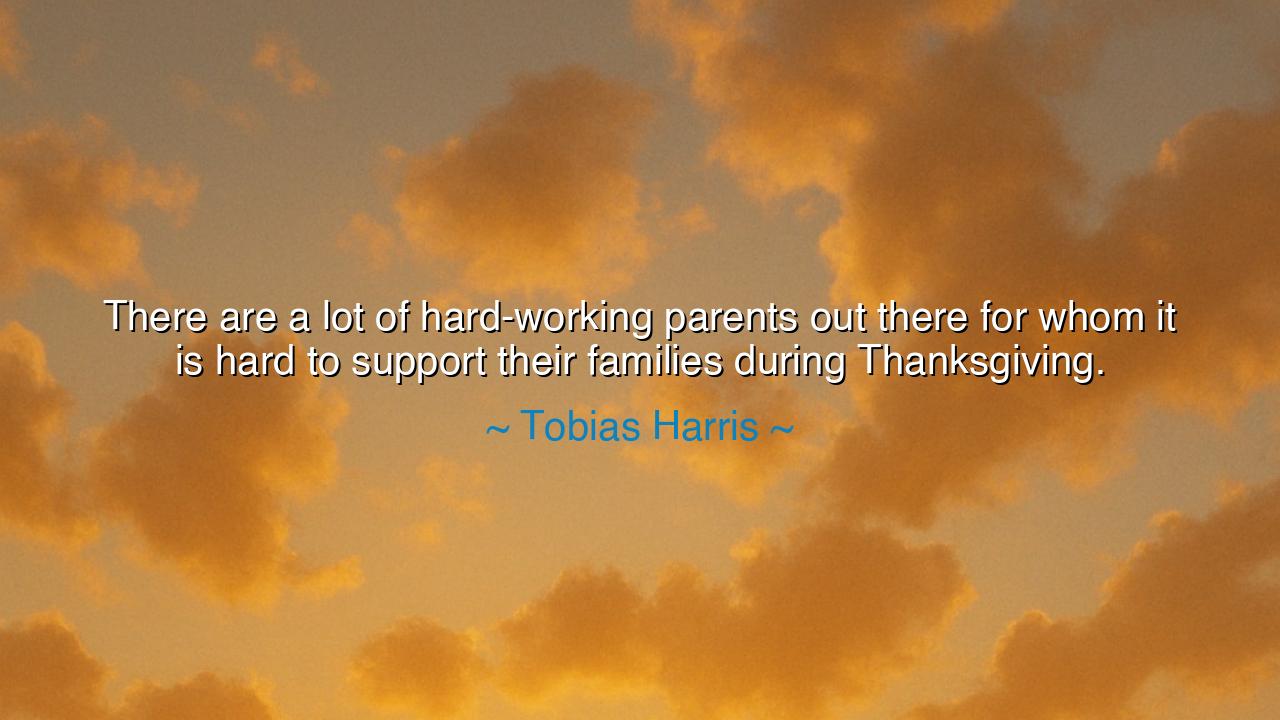
There are a lot of hard-working parents out there for whom it is
There are a lot of hard-working parents out there for whom it is hard to support their families during Thanksgiving.






In the words of Tobias Harris: “There are a lot of hard-working parents out there for whom it is hard to support their families during Thanksgiving.” This saying pierces the heart with both compassion and truth. It is a reminder that the feast of gratitude, which should be a time of joy and abundance, is for many a season of quiet struggle. Behind the glow of holiday lights and the aroma of roasted meals are fathers and mothers who toil with weary hands, striving to give their children not luxury, but dignity.
The ancients knew this plight well. For in every age there have been the laborers whose sweat sustained the nations, yet whose own tables were bare. To be a hard-working parent is to carry both burden and honor: burden, because the demands of life often exceed the means at hand; honor, because in every effort, no matter how small, shines the nobility of sacrifice. Harris’s words remind us that the struggle of such parents is not a mark of failure but of love, a love that gives even when the giving costs dearly.
Consider the story of Dorothea Lange’s photograph during the Great Depression, the Migrant Mother. Her face, weathered and strong, became the emblem of millions who labored in fields and factories yet could scarcely provide a meal for their children. Though history remembers her image as one of suffering, it is in truth an image of endurance, of a mother who—despite hunger, despite poverty—still fought to sustain her family. Her story mirrors Harris’s truth: that the world is filled with unseen parents, working with quiet heroism, even as feasts and celebrations unfold beyond their reach.
The mention of Thanksgiving carries a weight of irony. For the day is meant to honor abundance and gratitude, yet abundance is not equally shared. To the wealthy, it may mean banquets groaning with food; to the struggling, it may mean the hope of a simple meal cobbled together from scarce resources. But gratitude is not diminished by poverty. Indeed, it is often in the humblest homes that the truest thanksgiving is found—not for riches, but for one another, not for excess, but for survival.
Harris’s words also strike as a call to action. They remind us that those who have plenty bear a sacred duty toward those who have little. In the ancient world, it was said that the measure of a community was not in its temples or palaces, but in its care for widows, orphans, and the poor. To recognize the struggles of hard-working parents is to be moved to generosity, to extend one’s own blessings so that no family sits forgotten while others feast.
The lesson is clear: gratitude must be active, not passive. It is not enough to give thanks in word alone; one must also give in deed. If you are blessed with plenty, share it. If you have strength, use it to lighten another’s load. If you know of a neighbor, a friend, or a stranger struggling during Thanksgiving, extend kindness, for in so doing you honor not only them, but the spirit of the holiday itself.
Practical action is simple yet profound: donate food, give to local shelters, invite others to your table, or contribute to community drives. Teach your children that the feast is sweetest when shared, and that true wealth is not measured by what sits upon the table, but by how many hearts are nourished. Let your home be a place where gratitude overflows into generosity.
Thus, the words of Tobias Harris remind us of an eternal truth: that behind every holiday glow are those who sacrifice silently, and that the highest form of thanksgiving is not in eating, but in giving. Let us live as those who remember the unseen, honor the hard-working parents, and ensure that every family, in some measure, feels the warmth of being cared for. For in this lies not only compassion, but the very heart of gratitude.






AAdministratorAdministrator
Welcome, honored guests. Please leave a comment, we will respond soon